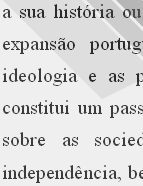

................................
While the voyages along the African coast and the land expeditions highlighted the scientific interests and the Portuguese priority in occupying positions to ensure control of the regions and develop a policy of influence with the African chiefs, the establishment of important white population nuclei replaced the "savages" and strengthened Portuguese sovereignty in the African territories to transform them into authentic sites of "national territory" (Rego, Idem, 1969, 7). The two 'historical truths' worked at a domestic level to awaken the national sentiment regarding Africa against the European usurper, while establishing the idea of Portugalisation based on a humanistic and original "colonial vocation". Time and the unique nature of the Portuguese became the pillar of the historical reason for colonial domination.
The fourth 'historical truth' emphasised the "hegemony" of the Portuguese in their relations with Africans, the latter dispossessed of their ancestral lands, since it was the legitimate colonial state that ensured the organisation and management of space. The idea of "hegemony" functioned at two levels: on the one hand, towards the other European colonisers, to account for "total Portuguese hegemony in tropical Africa", the result of "the great Historical Mission which Portugal has to fulfill" (Norton de Mattos, Memórias e Trabalhos da minha vida [Memories and Works of my life], III, 1944, 364), and on the other, to underline the indisputable and indispensable Portuguese direction and control in the relations established with the Africans.
This ideological certainty characterised Portugal's political choices during the war operations which marked the late 19th century and continued into the 20th century. Presented as indispensable to the enhancement of the territories, which simultaneously fostered and justified the creation of conditions necessary for the "civilising mission”, wars were the last resort of the "Portuguese [who] only waged them on the Africans when they were driven to do so by their [the Africans'] advances or when war became indispensable to extract the concessions they obstinately refused and that we absolutely lacked, such as that of transit through their domains, the exploitation of mines and others" (Botelho, Diferenças essenciais na génese de Angola e Moçambique. .., [Essential differences in the genesis of Angola and Mozambique…] 1938, 9-10).
